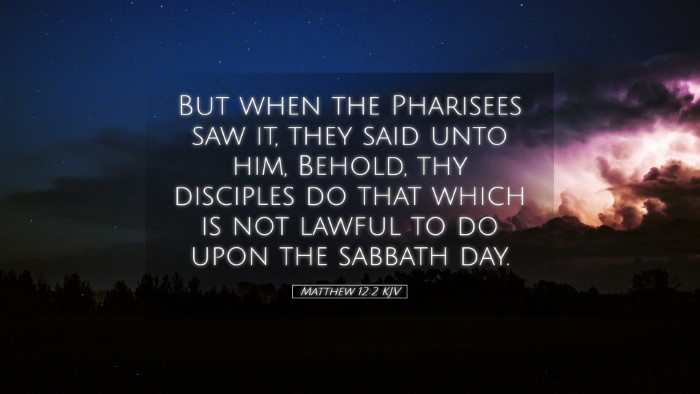Commentary on Matthew 12:2
Matthew 12:2 states: "But when the Pharisees saw it, they said unto him, Behold, thy disciples do that which is not lawful to do upon the sabbath day."
Contextual Analysis
The Pharisees, a prominent religious group in first-century Judaism, had a strict interpretation of the Mosaic Law, particularly concerning the Sabbath. In this passage, the disciples are criticized for plucking ears of corn to eat on the Sabbath. This incident serves as an illustration of the tension between Jesus and the religious leaders of His time, specifically regarding the observance and interpretation of the law.
Insights from Commentators
Matthew Henry's Commentary
Matthew Henry emphasizes the hypocrisy of the Pharisees in their application of the law. He points out that while they rigorously enforced the Sabbath regulations, they overlooked the deeper meanings of mercy and compassion that the law was intended to promote. Henry argues that the act of plucking grain was not a violation of the law but a necessity in the face of hunger, thus illustrating the principle that human need takes precedence over ritualistic observance.
Albert Barnes' Notes on the Bible
Albert Barnes further elaborates on the legalistic mindset of the Pharisees. He notes that their rigid adherence to the law led them to miss the spirit of the Sabbath, which was meant for rest and rejuvenation. Barnes highlights that Jesus’ disciples were not intentionally breaking the law but were acting out of necessity, which is permissible under biblical law. This confrontation showcases the conflict between legalism and the essence of grace and mercy that Jesus embodies.
Adam Clarke's Commentary
Adam Clarke offers a historical perspective, explaining that the Sabbath laws had become a burden due to numerous traditional interpretations by the Pharisees. Clarke provides an insightful analysis of the various man-made regulations that had been added to God's commandments, transforming the observance of the Sabbath into a legalistic struggle rather than a day of rest and recovery. He points out that the actions of the disciples, in picking grain, were not a transgression but rather a natural response to hunger, reinforcing Jesus' teaching that mercy triumphs over sacrifice.
Theological Implications
This passage invites a deep reflection on the nature of law and grace. It raises significant questions regarding the balance between obedience to God’s commands and the necessity of compassion in human relationships. The core message seems to be that adherence to the law should not come at the expense of human well-being. The act of the disciples, driven by need, serves as a reminder that God prioritizes human needs over mere ceremonial observance.
The Sabbath: Purpose and Meaning
In the Jewish tradition, the Sabbath was established as a day of rest, grounded in the creation account. Its observance is not merely about refraining from work but about embracing restfulness in God's presence. Jesus’ interpretation of the Sabbath challenges believers to reconsider how they observe this sacred time. Rather than viewing the Sabbath as a legal restriction, it should be seen as an invitation to experience God’s grace and to serve others.
Practical Applications
For pastors and theologians, this passage encourages preaching that emphasizes the importance of understanding the heart of the law. As evidenced in this confrontation, legalism can stifle the very spirit of Christianity. Modern-day believers must strive to ensure that their practice of faith does not become an oppressive burden but a source of life and joy.
Reflection Questions
- How can the principle of mercy over legalism be applied in today's church settings?
- In what ways might our understanding of Sabbath rest need reevaluation in light of Jesus' teachings?
- What can we learn about the balance between law and grace from Jesus' response to the Pharisees?
Conclusion
Matthew 12:2 offers a timely reminder to both religious leaders and laypeople that the act of observing religious laws must always be accompanied by a spirit of love, mercy, and understanding. It calls upon all believers to reflect on their relationship with the law, urging them to focus on the transformative grace of Christ, which transcends mere rule-following and invites them into a deeper relationship with God and one another.


